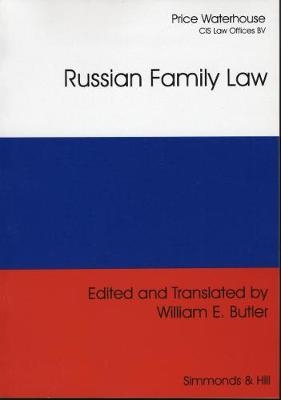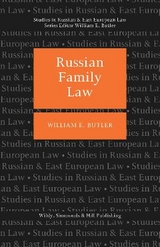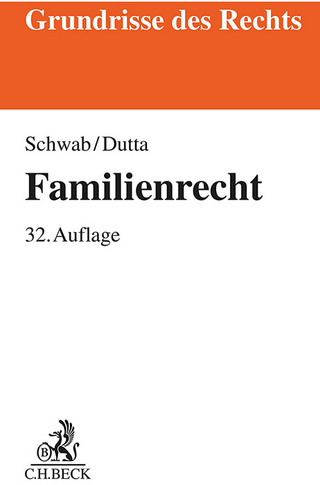
Russian Family Law
Seiten
1998
Wildy, Simmonds and Hill Publishing (Verlag)
978-1-898029-39-7 (ISBN)
Wildy, Simmonds and Hill Publishing (Verlag)
978-1-898029-39-7 (ISBN)
- Titel erscheint in neuer Auflage
- Artikel merken
Zu diesem Artikel existiert eine Nachauflage
The present code was adopted by the state Duma on 8th December 1995, signed by the President of the Russian Federation on 29th December 1995. It came into force on 1st March 1996.
In the post-soviet era family law has undergone surprisingly few changes. Adjustments would be the more appropriate term, including the elimination of the rhetoric of socialism which permeated the objectives of family legislation. It should be noted that family law falls within the joint jurisdiction of the Federation and subjects of the Federation. Some republics within the Federation have enacted their own family codes. The 1995 Family Code must be read against subordinate Russian legislation affecting family relations and above all against the 1997 Federal Law on Acts of Civil Status, which is expressly referred to in the Family Code on several occasions. Edicts of the President of the Russian Federation, decrees of the Government of the Russian Federation, and departmental acts, as well as international treaties of the Russian Federation. Many new elements in the 1995 Family Code were in fact introduced in the late Soviet or early post-Soviet era. The USSR Supreme Soviet, for example, had ratified the Convention on the right of a child on 13th July 1990. The Russian Federation, as the legal continuer of the USSR, is party to that Convention, the provisions of which have been incorporated into the Code. Other innovations include the introduction of an AIDS text for intended spouses; greater latitude is now allowed for spouses to choose compound surnames after marriage. Divorce procedures by consent have been altered slightly and the waiting period reduced. Creditor’s rights are also protected against the consequences of change or termination of a marriage contract by a debtor spouse.
In the post-soviet era family law has undergone surprisingly few changes. Adjustments would be the more appropriate term, including the elimination of the rhetoric of socialism which permeated the objectives of family legislation. It should be noted that family law falls within the joint jurisdiction of the Federation and subjects of the Federation. Some republics within the Federation have enacted their own family codes. The 1995 Family Code must be read against subordinate Russian legislation affecting family relations and above all against the 1997 Federal Law on Acts of Civil Status, which is expressly referred to in the Family Code on several occasions. Edicts of the President of the Russian Federation, decrees of the Government of the Russian Federation, and departmental acts, as well as international treaties of the Russian Federation. Many new elements in the 1995 Family Code were in fact introduced in the late Soviet or early post-Soviet era. The USSR Supreme Soviet, for example, had ratified the Convention on the right of a child on 13th July 1990. The Russian Federation, as the legal continuer of the USSR, is party to that Convention, the provisions of which have been incorporated into the Code. Other innovations include the introduction of an AIDS text for intended spouses; greater latitude is now allowed for spouses to choose compound surnames after marriage. Divorce procedures by consent have been altered slightly and the waiting period reduced. Creditor’s rights are also protected against the consequences of change or termination of a marriage contract by a debtor spouse.
William Butler is a Resident Partner of Price Waterhouse CIS Law Offices BV in Moscow.
| Erscheint lt. Verlag | 30.8.1998 |
|---|---|
| Übersetzer | William E. Butler |
| Verlagsort | London |
| Sprache | englisch |
| Maße | 145 x 210 mm |
| Gewicht | 275 g |
| Themenwelt | Recht / Steuern ► Allgemeines / Lexika |
| Recht / Steuern ► EU / Internationales Recht | |
| Recht / Steuern ► Privatrecht / Bürgerliches Recht ► Familienrecht | |
| ISBN-10 | 1-898029-39-3 / 1898029393 |
| ISBN-13 | 978-1-898029-39-7 / 9781898029397 |
| Zustand | Neuware |
| Haben Sie eine Frage zum Produkt? |
Mehr entdecken
aus dem Bereich
aus dem Bereich
Ehe, Scheidung, Unterhalt, Versorgungsausgleich, Internationales …
Buch | Softcover (2024)
dtv Verlagsgesellschaft
CHF 26,45



